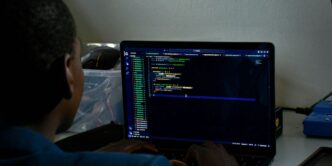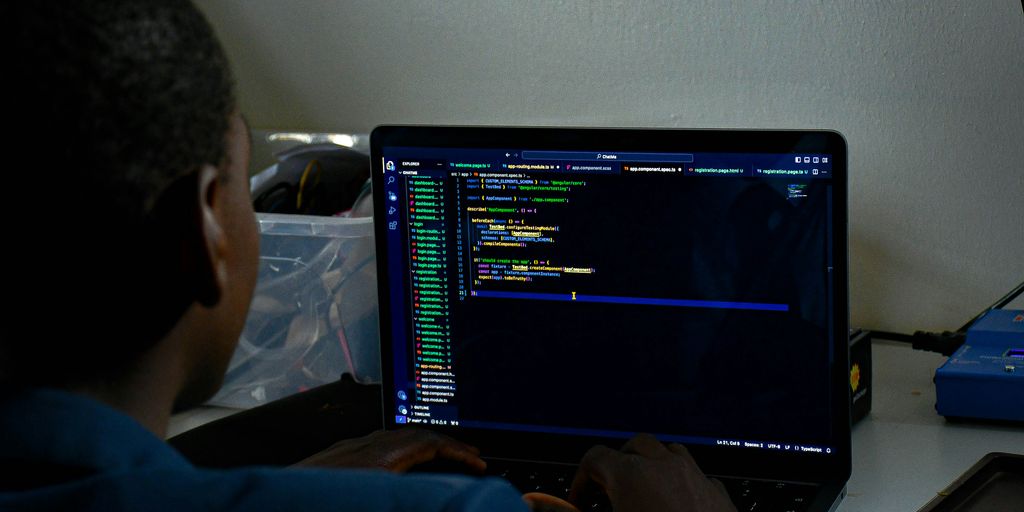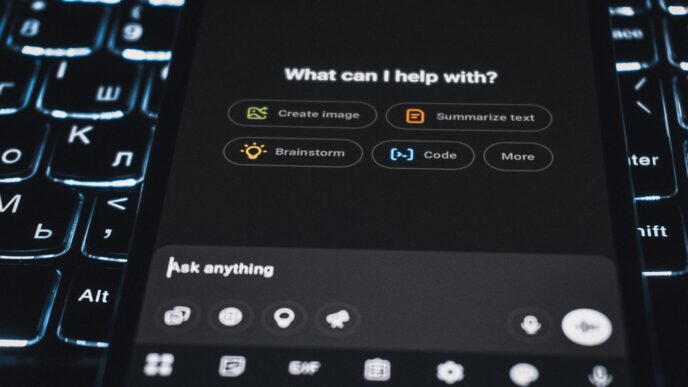So, you want to learn Python? It’s a really popular programming language, and for good reason. It’s used in tons of different jobs, from building websites to working with data. If you’re just starting out, or even if you know a little bit already, Codecademy is a pretty solid place to learn. This guide will walk you through how Codecademy can help you get good at Python, step by step. We’ll cover everything you need to know about using Codecademy Python to boost your skills.
Key Takeaways
- Codecademy helps you learn Python with different study paths.
- You can learn at your own speed with Codecademy’s flexible options.
- Codecademy lets you practice Python on real projects.
- Codecademy has courses for all levels, from beginners to advanced users.
- Learning Python on Codecademy can help you get ready for jobs.
Unlocking Python Potential with Codecademy
Codecademy is a great place to start if you’re looking to learn Python. It’s got a bunch of different courses and ways to learn, so it can fit pretty much anyone’s needs. I think the best part is how hands-on it is – you’re not just reading about code, you’re actually writing it. It’s a pretty good way to get your feet wet.
Tailored Learning Paths for Every Skill Level
Codecademy isn’t a one-size-fits-all kind of thing. They’ve got paths designed for total beginners who’ve never seen a line of code, and they’ve got stuff for people who already know a bit and want to get better. It’s nice because you can jump in wherever you’re comfortable and not feel lost or bored. They really do try to meet you where you are.
Flexible Self-Paced Study Options
Life’s busy, right? That’s why I like that Codecademy lets you learn at your own speed. You can do a little bit each day, or you can binge-watch the courses on the weekend. It’s all up to you. No pressure, no deadlines. Just learn when you can. This is especially helpful if you’re juggling work, family, or other commitments. You can learn Python for free on Codecademy.
Practical Skill Application for Real-World Projects
Okay, so learning the theory is cool and all, but what really matters is being able to use what you learn. Codecademy gets that. They’ve got projects that let you apply your skills to real-world scenarios. It’s not just about memorizing syntax; it’s about building stuff that actually works. This is where you really start to see how Python can be used to solve problems. It’s a game-changer when you can point to something you’ve built and say, "I did that!"
Core Python Course Offerings on Codecademy
Codecademy has a bunch of Python courses. They’re made to fit what you want to learn. It doesn’t matter if you’re just starting out or if you’ve coded before, there’s probably a Python course for you. These courses cover a lot, like the basics, looking at data, machine learning, and even making websites.
Mastering Python 3 Fundamentals
This course is all about getting the basics down. You’ll learn about things like variables, loops, and functions. It’s like building the base for a house – you need it to be strong before you can build anything else. You’ll also learn about Python syntax, which is super important for writing code that actually works. It’s not the most exciting stuff, but it’s what you need to know to move on to cooler projects.
Exploring Data Analysis with Python
Okay, this is where things get interesting. Data analysis is all about taking information and finding patterns. With Python, you can use libraries like Pandas and NumPy to do some pretty powerful stuff. Imagine you have a huge spreadsheet – these tools let you sort, filter, and analyze that data in seconds. It’s like having a superpower for understanding numbers. You can even make cool charts and graphs to show off what you’ve found. Here’s a quick look at some common data analysis tasks:
- Data Cleaning: Getting rid of errors and inconsistencies.
- Data Visualization: Making charts and graphs to see trends.
- Statistical Analysis: Finding averages, medians, and other important numbers.
Diving into Machine Learning Applications
Machine learning is like teaching a computer to learn from data. It sounds complicated, but Python makes it easier with libraries like Scikit-learn. You can build models that predict things, classify data, and even make recommendations. Think about Netflix suggesting shows you might like – that’s machine learning in action. It’s a field that’s growing fast, and learning it can open up a lot of doors. Codecademy’s courses help you understand the machine learning applications and how to use them.
Advanced Python Skill Development
Okay, so you’ve got the basics down. Now it’s time to really get into the cool stuff. Codecademy has some paths that can help you specialize. It’s like, you know, picking your major in college, but for Python. Let’s look at some options.
Building Robust Web Applications
Web apps are everywhere, and Python is a great way to build them. You can learn frameworks like Django and Flask, which make building complex web applications way easier. These frameworks handle a lot of the behind-the-scenes stuff, so you can focus on the features that matter. You’ll learn about:
- Routing: How to handle different URLs.
- Templates: Creating dynamic HTML pages.
- Databases: Storing and retrieving data.
- User Authentication: Managing user accounts and security.
Financial Analysis with Python
Want to crunch numbers and make sense of financial data? Python is your friend. Libraries like Pandas and NumPy are super useful for analyzing stocks, creating models, and visualizing trends. It’s like having a super-powered spreadsheet at your fingertips. You can use these skills to:
- Analyze stock prices.
- Build financial models.
- Automate reporting.
- Visualize data with charts and graphs.
Interactive Web Development Techniques
This is where things get really interesting. You can use Python to create interactive web experiences using tools like Bokeh or Dash. Imagine building dashboards that update in real-time or creating interactive data visualizations. It’s all possible with Python. You’ll explore:
- Creating interactive plots.
- Building web-based dashboards.
- Connecting to data sources.
- Deploying your applications online.
If you are looking for Python projects to improve your skills, there are many resources available.
Enhancing Your Codecademy Python Journey

Okay, so you’re cruising along with your Python learning on Codecademy. That’s great! But how do you really make the most of it? It’s not just about passively going through the lessons. It’s about getting involved and using all the resources they have. Let’s talk about how to seriously boost your technical skills mastering with Codecademy.
Engaging Interactive Tutorials
Codecademy’s interactive tutorials are a big deal. They’re not just videos; you’re actually writing code right there in the browser. This hands-on approach is key to really understanding how things work. It’s way better than just reading about it. You get instant feedback, which helps you catch mistakes and learn faster. I remember when I was first learning, I’d get stuck on the simplest things, but the interactive tutorials helped me work through them.
Access to Real-World Projects
One of the coolest things about Codecademy is the real-world projects. These aren’t just theoretical exercises; they’re simulations of what you’d actually be doing on the job. For example, you might build a simple web application or analyze a dataset. This is where you really start to see how Python can be used to solve problems. It’s also a great way to build your portfolio, which is super important when you’re looking for a job.
Supportive Community Learning Environment
Don’t underestimate the power of the Codecademy community. It’s full of other learners who are going through the same things you are. If you’re stuck on something, you can ask for help in the forums or on the Codecademy Discord server. There are also mentors who can provide guidance and feedback. Plus, it’s just nice to know that you’re not alone in your learning journey. I’ve made some great connections through the Codecademy community, and it’s been a huge help in my own development.
The Versatility of Python Programming
Wide Industry Applications
Python is everywhere these days. It’s not just for software engineers anymore. You see it in web development, data science, even in automating simple tasks. Its adaptability makes it a go-to language across many sectors. Think about it: from analyzing financial data to controlling robots, Python’s got a hand in it. It’s pretty wild how one language can do so much. For example, I was reading about how Python is used in computer programming for things like AI and machine learning. It’s definitely a skill worth having.
Simplicity and Readability Benefits
One of the best things about Python is how easy it is to read. Unlike some other languages that look like a jumbled mess of symbols, Python’s syntax is pretty straightforward. This makes it easier to learn and use, especially if you’re just starting out. Plus, readable code means fewer bugs and easier collaboration. It’s like writing in plain English, but for computers. I remember struggling with C++ in college, and then Python felt like a breath of fresh air.
Empowering Complex Application Development
Don’t let Python’s simplicity fool you; it’s incredibly powerful. You can build some seriously complex applications with it. From web apps to scientific simulations, Python can handle it all. It has a huge library of modules and frameworks that make development faster and easier. I’ve seen people build entire operating systems using Python. It’s amazing what you can do with a little bit of code and a lot of creativity. Here’s a quick look at some common applications:
- Web Development (Django, Flask)
- Data Science (Pandas, NumPy)
- Machine Learning (TensorFlow, Scikit-learn)
- Automation (Selenium, Ansible)
Achieving Mastery with Codecademy Python
Structured Learning for Beginners
Codecademy really shines when it comes to getting started. The courses are set up in a way that makes sense, even if you’ve never seen a line of code before. They break down complex ideas into smaller, easier-to-digest pieces. You’ll start with the very basics, like what a variable is and how to write your first program. It’s all very step-by-step, so you don’t feel lost. Plus, you get immediate feedback, which is super helpful when you’re just learning the ropes. It’s a great way to build a solid Python foundation.
Navigating Advanced Programming Topics
Once you’ve got the basics down, Codecademy has stuff to help you move on to more complex topics. This includes things like object-oriented programming, working with databases, and even diving into web development frameworks. It can feel a little overwhelming at first, but the courses are designed to guide you through it. They use real-world examples, which makes it easier to understand how these advanced concepts actually work. It’s not just theory; you’re building things that you could actually use. Here’s a quick look at some advanced topics:
- Object-Oriented Programming (OOP)
- Database Management (SQL, NoSQL)
- Web Frameworks (Django, Flask)
Acquiring Job-Ready Python Skills
One of the best things about learning Python on Codecademy is that it can actually help you get a job. The courses are designed to teach you skills that employers are looking for. You’ll learn how to write clean, efficient code, how to work with data, and how to build applications. Plus, you’ll have a portfolio of projects to show off your skills. And getting a certificate of completion can definitely help your resume stand out. It’s a practical way to learn Python and get ready for a career in tech.
Wrapping Up Your Python Journey
So, there you have it. Going from knowing nothing about Python to being pretty good at it is a big deal, and it takes some work. But it’s totally worth it. If you stick with this guide, you’ll get a good handle on things, learn the harder stuff, and pick up the skills you need to actually build things. Remember, Python isn’t just some code; it’s a way to make all sorts of stuff, from small scripts to big, complicated programs. Just keep learning, stay curious, and enjoy getting better and better with Python.
Frequently Asked Questions
What kind of Python courses does Codecademy offer?
Codecademy has different Python courses for all skill levels. You can learn the basics, how to work with data, or even how to build websites.
Can I learn Python at my own pace on Codecademy?
Yes, you can learn at your own speed and from anywhere with an internet connection. This makes it easy to fit learning into your schedule.
How does Codecademy help me learn Python skills?
Codecademy helps you learn by doing. You get to try out coding right away with interactive lessons and work on projects that are like real-world tasks.
Is there support available if I get stuck while learning?
Codecademy has a helpful community where you can ask questions and get support from other students and teachers.
Why is Python a good language to learn?
Python is used in many different jobs, like making websites, analyzing information, and even creating smart computer programs. Learning Python opens up many job opportunities.
Will learning Python on Codecademy help me get a job?
Yes, Codecademy courses are designed to give you the skills that companies are looking for, helping you get ready for a job in tech.














